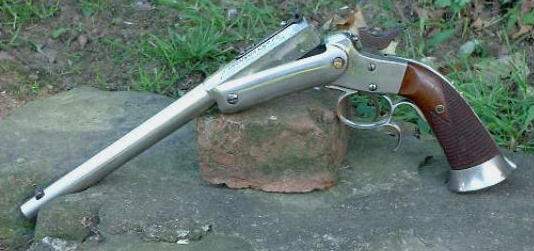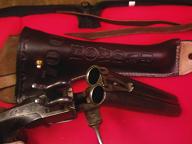

 The Accurate Reloading Forums
The Accurate Reloading Forums  THE ACCURATE RELOADING.COM FORUMS
THE ACCURATE RELOADING.COM FORUMS  Guns, Politics, Gunsmithing & Reloading
Guns, Politics, Gunsmithing & Reloading  Single Shot Pistols
Single Shot Pistols  Split necks in 309JDJ
Split necks in 309JDJGo  | New  | Find  | Notify  | Tools  | Reply  |  |
one of us |
Hi all, I took my 309 JDJ out to burn up some old ammo the other day. And I got 5 split necks out of 8 rounds. The brass had only been loaded about 3 times. These loads were about 2years old. The load was within those supplied by SSK. I've never had this happen on any other caliber. I'm wondering if I should have anealed the necks after fireforming? Any thoughts? | ||
|
| one of us |
This has happened to me. When sizing down from 44 to 30 caliber if the case mouth isn't perfectly round tiny cracks will result in the neck area that cause this. This has happened to me during the inital necking down process of new brass and after firing . I was told to run all my cases threw a 444 Marlin sizing die first. This will true up the case mouths. | |||
|
| one of us |
Hi Lar45, Been there. Time to anneal your brass. I had cases split while they were sitting in the ammo box. I also had the same problem with my 375JDJ after about 6 firings. Since I annealed the necks I haven't lost a one. I use Varmint Al's method. http://www.varmintal.com/arelo.htm#Anneal ANNEALING CASE NECKS.... After 5 to 10 loadings for factory-chambered rifles and the associated neck sizing, the case necks are strain hardened due to the cold working of the brass. Eventually, if you don't anneal, you will start to get split necks. Also, after wildcat case forming from one neck size to another, the necks and shoulders will be hardened. The necks may easily be annealed to remove the high residual stresses and restore the desired low yield stress and desired dead soft condition. Here is how I anneal case necks. I use a Propane Torch that I got at the hardware store. I stand it up on a table and adjust the flame till the inner blue cone flame tip is about 1 inch long. I make a case spinner out of a bamboo shish kebab stick. I cut a piece about 4 inches long and whittle down about 3/8 inch of one end so it will easily fit in the flash hole and slip a small hex nut over the end for a stop. I put some tape or glue behind the nut to hold it in place. I fill a big bowl with cold water. I do the annealing in a black dark place, like at night with the lights off or in a dark room. I put the stick through the flash hole and, holding the stick, spin the case mouth in the flame while holding the center of the neck right at the tip of the blue center cone of the flame. When the neck just becomes a visible dull red (about 750�F), I drop the case in the bowl of water. The neck and most of the shoulder are now stress free in a dead soft condition and my case neck is in the "like new" condition. Do not anneal the necks in a lighted room. You won't be able to detect the dull red color and by the time you see red, the brass is already too hot. This burns out the zinc, ruining the brass. Do not anneal any other part of the case. A soft case head does not have enough strength to support the high gas pressures and could easily rupture. After annealing, I put the cases in a bowl and dry them with a hair drier. Don't get them so hot that you can't pick them up. I blow dry them and wait 30 minutes or so and give them another blow dry. If you are more patient, you can let them air dry overnight. | |||
|
| one of us |
Brass cracks when it gets brittle.Two things that I know of that will make brass brittle are work hardening and nitrogen embrittlement.Most likely your brass cracked because it became work hardened,which means it should have been annealed before loading. I anneal any brass that is to be formed and also when they have been fired several times.I very seldom split any necks even with hot loads. Nitrogen embrittlement usually happens when brass comes in prolonged contact with nitrogen compounds for prolonged periods,such as ammonia. Sometimes smokeless powder will breakdown in storage releasing nitrogen which will cause cracks usually that takes decades to happen.The necks on many of the 30/40 Krags that were loaded in the late 1800s will crack in storage due to deteriorated powder. WC | |||
|
one of us |
Thanks, I think I'll pull the bullets on all my ammo and aneal the necks and start over. | |||
|
| Powered by Social Strata |
| Please Wait. Your request is being processed... |
|

Visit our on-line store for AR Memorabilia

